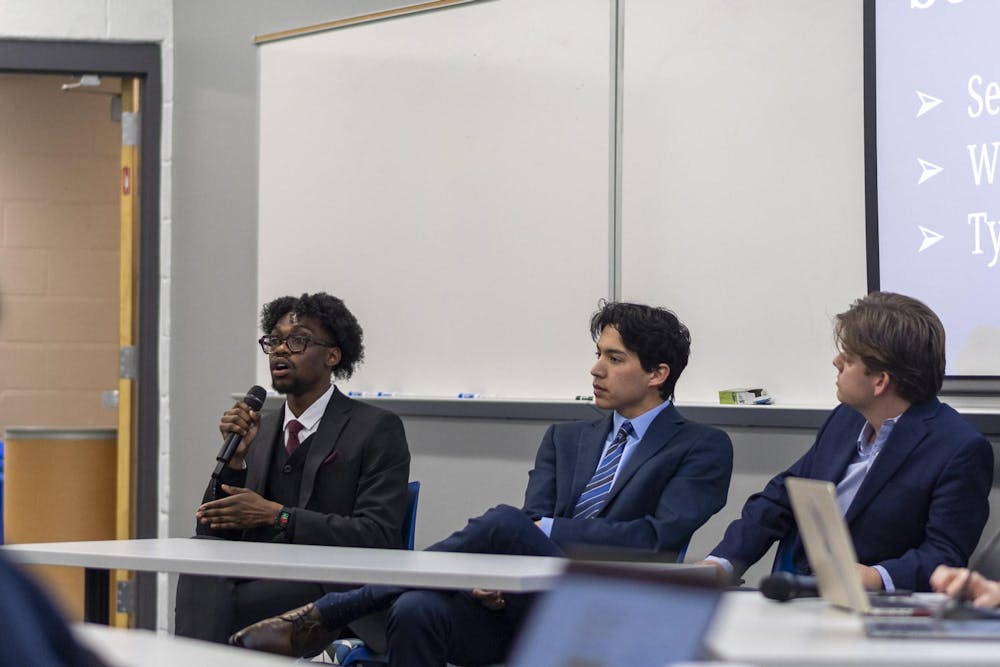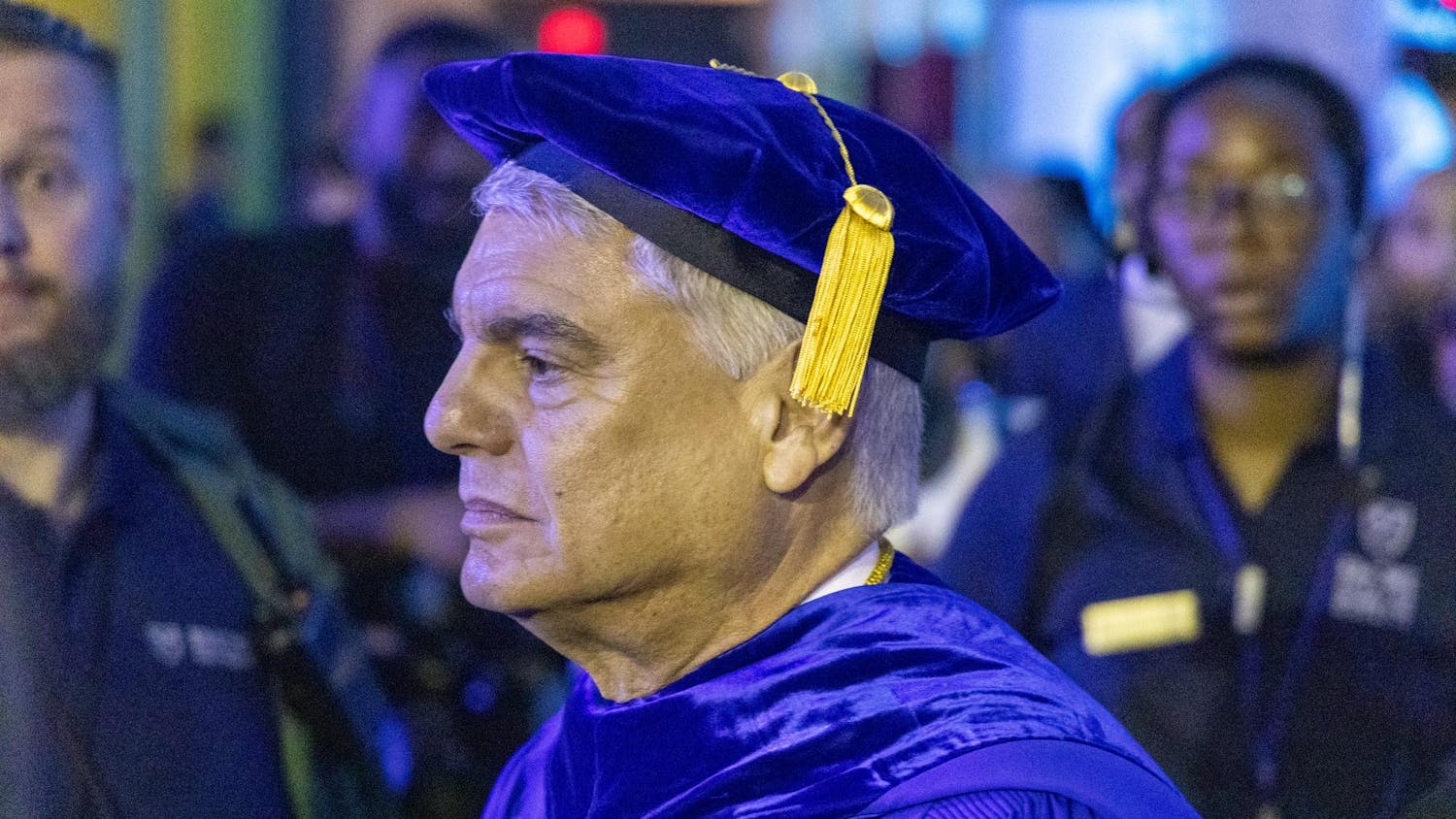Content Warning: This article contains references to sexual assault.
Prior to this year’s student government elections, The Emory Wheel held its 13th annual Wheel Debates on Feb. 20 to hear from candidates running for various positions in the Bachelor of Business Administration (BBA) Council, College Council and Student Government Association (SGA).
About 100 people joined the event in-person and virtually to watch as the Wheel’s Editors-in-Chief Madi Olivier (25C) and Sophia Peyser (25C) moderated the two-hour event.
Voting begins on Feb. 25 and ends on Feb. 28.
BBA Council presidential debate
The event started off with a debate between the BBA Council presidential candidates. BBA Council Vice President of Diversity, Equity and Inclusion Cate Navarrete (26B) and BBA Council Vice President of Programming Sydney Song (26B) expressed their hopes for improving the Goizueta Business School community.
Navarrete’s platform focuses on improving “academic innovation,” strengthening opportunities for career preparedness, increasing global connectivity for Goitzueta students and establishing more community-building events.
During the debate, Navarrete highlighted her commitment to fostering collaboration within Goizueta by promoting underrepresented career paths and encouraging students to pursue joint concentrations under both Goizueta and the Emory College of Arts and Sciences.
“The reason why there’s the rumors and lore about the B-school being competitive is because people are fighting for the same positions,” Navarrete said. “By democratizing access to information and promoting inclusivity, we can really remedy that culture.”
Navarrete emphasized diversity within BBA Council, reflecting on her experience running her non-profit, Body Positive Alliance, and serving on the Student Accessibility Board.
“All students deserve the right to feel seen and represented in the business school,” Navarrete said.
Song presented her platform, which focuses on amplifying student voices and fostering a more well-rounded experience for students. She emphasized her commitment to supporting diverse student interests, including the intersection of business with the arts, entrepreneurship, film and technology.
Song also shared her proposal to create anonymous feedback forms and a hub to promote transparency between students and the BBA Council. This hub would include information on the BBA Council’s policy changes and guidance on the club chartering process.
“I really want students to be able to voice their opinions about what they need and what they’re looking for through feedback,” Song said.
When asked how she would manage being BBA Council president while studying abroad in Portugal this semester, Song emphasized her ability to stay actively involved despite the distance. It was past midnight in Portugal when she joined the debate over Zoom.
“That definitely is something that I acknowledge will be challenging, but I am very committed,” Song said. “If I do become president, I am 100% in it and will take the time to make sure to get to know everyone and conduct interviews as fairly and as smooth and efficiently as possible.”
BBA Council Vice President of Programming Simon Stumbris (26B) is running unopposed to be the next BBA Council vice president and did not attend the debate.
College Council vice presidential debate
Ellie Estridge (28C) and Oxford Student Government Association (OxSGA) Speaker of the Senate Braden Newsome (25Ox) are running to be the next vice president of College Council. Estridge, a member of the softball team, did not attend the debate.
Newsome expressed how his experience in student government has prepared him to work effectively with University administration.
“Not only am I speaker of the senate, I’m chair of the Arts and Academics Committee, which means my job is basically bugging the academic affairs department into doing almost nothing every single year,” Newsome said. “I like to say I’m hitting my head against the wall until I start bleeding, and then I keep doing it. … The most important thing is just keep trying.”
Newsome focused on improving communication in College Council, referencing how he has helped increase support and outreach for students through his roles in OxSGA.
OxSGA President Kenan Bajraktarevic (25Ox) attended the debates and applauded the mentions of issues affecting Oxford College throughout the night.
“I have not heard Oxford mentioned so frequently in SGA elections until this one,” Bajraktarevic said. “Despite all of the different views from all the candidates, I feel like a consistent talking point has included Oxford in one way or another, and that just makes me so happy.”
Newsome said that despite being from Oxford, he is ready to address the needs of the Atlanta campus and Emory University at large. He added that although distant, the same issues on the Atlanta campus are also present at Oxford.
“Emory University is Emory University, whether I’m at Oxford or I’m at Atlanta, and so I think that the issues we face, while not identical, are similar,” Newsome said. “Mental health is an issue everywhere. Having a supportive community is an issue everywhere. Making sure your student government is working for you is an issue everywhere, and it’s just as true at Oxford as it is … at the Atlanta campus.”
College Council presidential debate
Emory College Republicans President Si Kai Feng (28C) and College Council Chief of Staff Vladyslav Senenko (27C) are competing to become the next president of the College Council, the legislative body that oversees Emory College, the University’s largest undergraduate school.
Feng and Senenko criticized the current state of College Council and offered suggestions to improve the bureaucracy that they believe plagues the body’s efficiency
Feng offered two solutions to this problem: increasing club funding transparency and raising money from alumni. He noted that he has done the latter after restarting Emory College Republicans.
On the other hand, Senenko recommended revising College Council’s current financial documents to help smaller clubs grow. Additionally, he said he would be more transparent about how the Student Activity Fund is distributed and encourage student input on the matter. Seneko said doing this would free up more funds for smaller clubs.
“The foundation of this reform should be a big internal governance change and revision of all the documents, similar to what SGA has done in the past last semester,” Senenko said. “That would be able to revise our current financial documents and therefore improve the efficiency for the system and provide some clear framework for how can we improve the system in the future.”
The candidates differed in their views regarding stipends for College Council legislators and executives. Recently, College Council tabled a bill that would have provided stipends to legislators, which has sparked some debate about the fairness of the bill.
Feng said he was “very against” stipends for College Council members.
“If you’re elected to this role, you should be helping students,” Feng said.
However, Senenko argued that the issue was more nuanced. He stated that there should be a conversation for student government members who may need monetary support.
“I did not support the current stipend bills that were presented,” Senenko said. “What we lacked was the consultation with the student body. The distribution of the Student Activity Fee without consultations with other executive agencies and other governing bodies was not appropriate in that sense.”
Senenko added that if student government organizations across Emory came together to devise a solution to the question about stipends, he might favor a stipend proposal.
“I do believe there is an argument to be made for the stipends to be introduced,” Senenko said. “It could increase the initiative that exists within College Council and other executive agencies and provide support for those in need.”
Senenko and Feng also disagreed on how College Council should address polarization on campus. Feng argued that political tension on campus is already minimal because Emory students are mostly liberal, and College Council should avoid involving itself in politics.
“He’s got an incredibly diverse opinion,” Erin Ford (28C), a friend of Feng’s, said. “He stands out on campus. I haven’t really met anyone like him before. In a campus that is so politically one-sided, I would say mostly one-sided, he offers, funding-wise, a different perspective.”
Conversely, Senenko disagreed, saying the “vibrant Emory community” has plunged into “unhealthy debate.” Instead of avoiding politics, Senenko argued that College Council should provide support systems for students to feel comfortable and represented on campus.
“College Council needs to step up and take initiative on this and actually foster a cultural dialogue,” Senenko said. “We will not be able to solve all the world’s problems. That is a fact. We’re College Council. However, we do have the power to ensure the students feel comfortable and safe on campus.”
SGA vice presidential debate
Maahi Sethi (27C), Zoe Grotjan (24Ox, 26B) and Kenneth Power (27C) are all running for SGA vice president. Power, who is the vice president of service at Alpha Kappa Psi and is running alongside SGA presidential candidate Walker Liu (26C), did not attend the debate.
Sethi, SGA’s First Year Council director, is running on a ticket with SGA presidential candidate Seth Weinfield (27C). Grotjan — who serves as BBA Council’s SGA representative — is on a ticket with SGA presidential candidate Tyler Martinez (26C).
Sethi emphasized the importance of community and belonging through her plans to create a disability identity space and rework Emory’s Respect for Open Expression Policy. She hopes to act as a liaison between students and administration, bringing concerns to the University Senate and facilitating feedback through town halls with Open Expression Programs Director Lisa Loveall.
“It’s important for the students who are involved in activism and advocacy on this campus to know what the policy is, what it’s going to change to and what it currently stands for,” Sethi said.
Grotjan focused on the need for fundamental changes within SGA. Her platform prioritizes promoting safety and open expression, focusing on addressing sexual assault policies and bias reporting.
During the debate, Grotjan said was “disappointed” in the feedback she received from students who filed bias reports with the Emory administration. Grotjan said she would fix this issue by strengthening the relationship between the administration and students. Martinez and Grotjan also hope to devise a policy stating that anyone who has repeated bias reports filed against them will not be able to hold positions of power at Emory, according to their platform.
On the issue of student protests, Grotjan and Sethi criticized University President Gregory Fenves’ addendum to the open expression policy that banned encampments, calling the revision a violation of collective governance.
“Students … should be willing and able to protest however they want, as long as we’re ensuring that everyone else is safe on campus as well,” Grotjan said.
The University’s addendum breached students’ trust in shared governance between administration and students, according to Sethi, and she promised to work to prevent similar events from transpiring in the future.
“It was a violation of our shared governance principles and trust that you have put into student government and the University to lead us properly,” Sethi said. “That is something that the future SGAs will work on, making sure that that doesn't happen.”
SGA presidential debate
Alpha Tau Omega Treasurer Walker Liu (26C), Emory National Association for the Advancement of Colored People Second Vice President Tyler Martinez (26C) and Second-year SGA and College Council Legislator Seth Weinfield (27C) offered their platforms and perspectives as SGA presidential candidates. Although each candidate ran on a ticket with a vice presidential candidate, the Emory community can elect any combination of presidential and vice presidential candidates, as the votes cast for each are separate.
A major point of discussion was the candidates’ views on open expression and the University and SGA’s responses to the April 2024 encampment on the Quadrangle. Law enforcement officers ended the pro-Palestinian encampment and arrested 28 protestors, including 20 members of the Emory community.
Weinfield condemned Fenves’ addendum to prohibit encampments. He recommended that the University adopt the First Amendment standards that the University Senate’s Committee for Open Expression proposed last month.
“Shared governance is a principle of democracy, and we cannot and must not erode it,” Weinfield said. “That is something that is non-negotiable, and we completely disagree with the unilateral addendum to the open expression policy.”
Liu said he would focus on better representing the views of Emory students by talking to student leaders and creating opportunities for students to share their opinions and concerns. Similarly, Weinfield proposed an SGA open expression subcommittee for all students to express their opinions on open expression.
Martinez, on the other hand, focused on targeting hate speech and hopes to reform the current bias reporting practice. He claimed that many students wait months for the University to respond to their reports, which he believes is unfair.
“While we do prioritize free speech, we want to make sure that every student, regardless of their background, is supported,” Martinez said.
Another key issue of the night was Weinfield’s proposed bill to create stipends for College Council legislators. Weinfield shared the bill with College Council last month, but the group unanimously voted to table the proposal.
Weinfield said he was “uncomfortable” with the idea of socioeconomically disadvantaged students having to choose between a student government position and finding a job. However, Liu and Martinez disagreed with Weinfield, with both candidates noting that College Council should instead use its funding to support student clubs' growth.
Liu pointed out that Weinfield’s bill specifically set aside an extra $500 to pay Third-year College Council Legislator and SGA Ranking Member Sohan Bellam (26C), which he called “unacceptable.”
“Incredible amounts of things can be done on this campus, and that’s what I’m focused on — programs for these small and medium-sized clubs,” Liu said. “But this can't happen if we’re taking this money and we’re paying ourselves for this job.”
Martinez recognized the “time and energy” necessary to be a student leader but criticized the practice of paying legislators.
“Regardless of whether I get paid for my position or not, I know that I still have the same passion and same drive that I have now to make impactful changes,” Martinez said. “Me getting paid doesn’t impact whether I care about our performing arts organizations having equitable access to spaces. It doesn't change the fact that our underrepresented groups and our cultural groups are struggling to access food for their events. It doesn’t change the fact that our students are being verbally assaulted in reporting bias incidents and they aren’t getting listened to.”
If you or someone you know experienced sexual assault, you can access Emory’s Department of Title IX at 404-727-0541 and the Office of Respect’s hotline 24/7 at (404) 727-1514. You can reach the RAINN National Sexual Assault hotline 24/7 at (800) 656-4673. You can reach the Atlanta Grady Rape Crisis Center crisis hotline 24/7 at (404) 616-4861 and the Decatur Day League Sexual Assault Care and Prevention crisis hotline 24/7 at (404) 377-1428.

Jacob Muscolino (he/him) (28C) is a News Editor at The Emory Wheel. He is from Long Island and plans to major in History and Psychology. Outside of the Wheel, he is involved in Emory Reads and Emory Economics Review. You can often find Jacob watching the newest blockbuster for his Letterboxd, dissecting The New York Times and traveling to the next destination on his bucket list.






